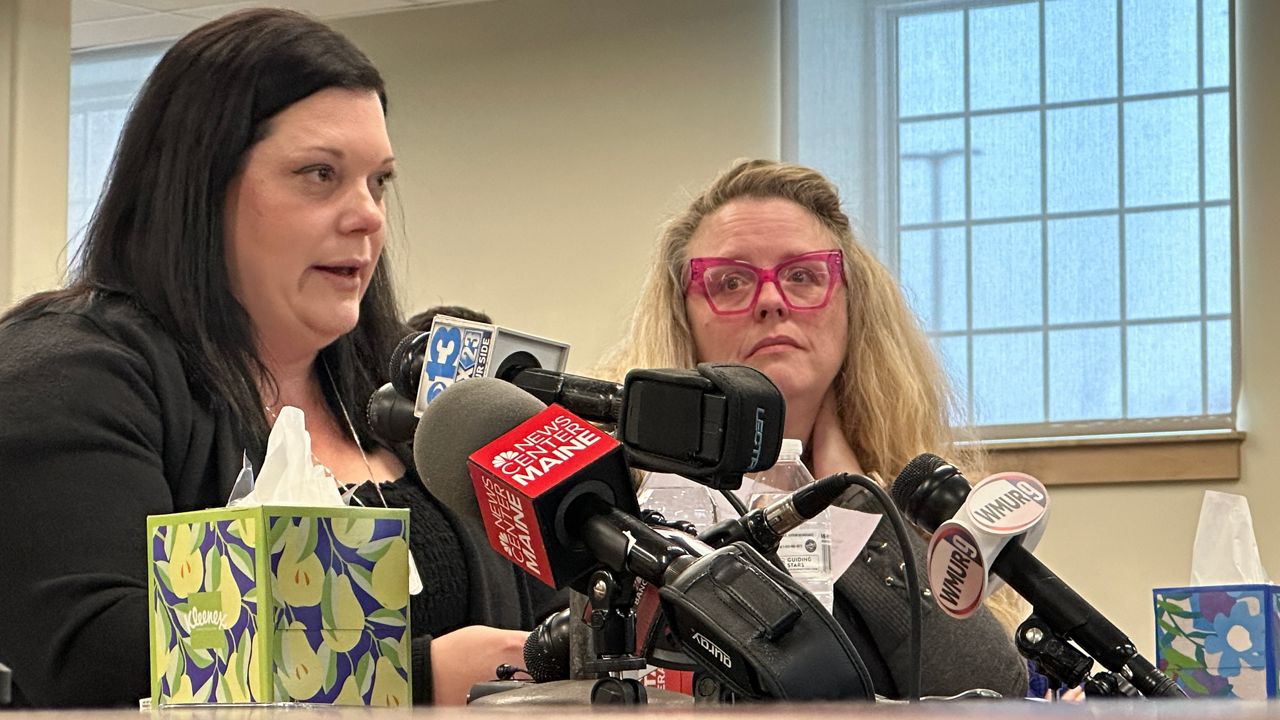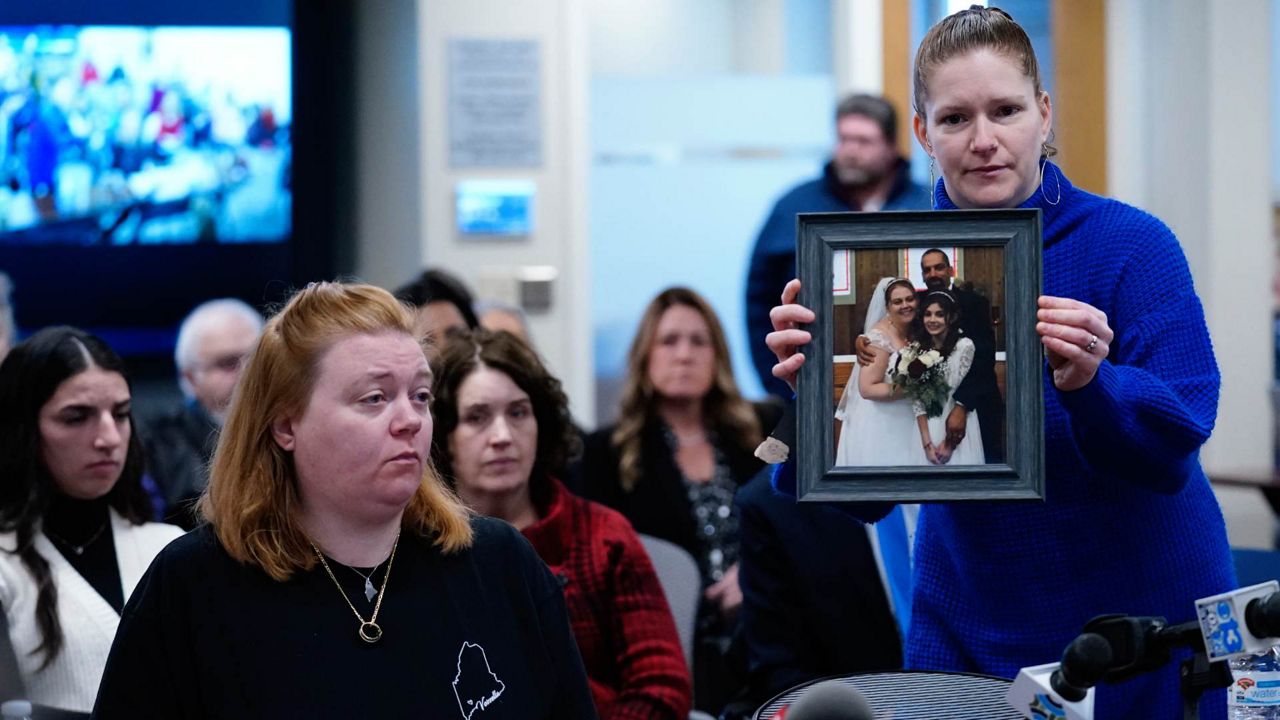Before Peyton Brewer-Ross was gunned down in Lewiston on Oct. 25, he would play a game with his young daughter.
Just before bedtime, she would stand at the top of the stairs and say, “Daddy where are you?”
He would peek his head out from the bottom of the stairs as part of the nighttime ritual, one of the many things that is now just a memory for his family. His daughter Elle, who recently turned 2, still occasionally calls out for her father, Brewer Ross’s fiancée Rachael Sloat told a panel investigating the shootings on Thursday.
“I want those words -- ‘Where are you?’ -- I want that to resonate in the ears of anybody who hears this. Every politician, every member of law enforcement, every registered voter in this country. I want you to hear those words ‘where are you?’” Sloat said. “Because my fellow Americans, where are you? We failed my little girl.”
Sloat was one of several family members of the 18 people killed in Lewiston to testify Thursday in front of the commission charged with investigating the circumstances surrounding the shootings.
They described the confusion of not knowing whether their loved ones had died, the multiple calls to hospitals trying to locate their son, or brother or partner. The anger of seeing names on social media before they had been officially notified by police. And the lingering terror and stress prompting one woman to now carry a gun and flinch at loud sounds, and another to cope with cognitive issues so severe she carries a notebook to jot down ideas before she forgets them.

(Cassandra Violette, daughter-in-law of Lewiston shooting victims Bob and Lucille Violette, talks about how life has changed since the mass shootings on Oct. 25. (Spectrum News/Susan Cover)
The commission invited the victims’ families to share their stories as it works toward finding answers to what led up to the night that Robert Card, 40, of Bowdoin, shot and killed 18 people at a bowling alley and a bar in Lewiston.
“The commission’s primary task is to determine whether the response from the police and others to Robert Card’s downward spiral of mental illness was appropriate and whether the tragedy could have been prevented by an effective intervention in accordance with current law,” commission chairman Dan Wathen said.
He said while that’s their primary focus, the commission has a responsibility to understand “the horror and destruction that this incident produced on you folks. We must never forget the cruel aftermath of this senseless mass shooting.”
Among those killed were four members of the Deaf community and for their family members, the lack of interpreters in the hours after the event left them confused and anxious for information.
Elizabeth Seal, wife of interpreter Joshua Seal, who was killed at Schemengees Bar and Grille, described her husband as a family man who was an advocate for those in the Deaf community.
The couple has four children, and they were a tightknit family that “did everything together,” Seal told the commission through an interpreter. She said Josh often worked as an interpreter during the COVID-19 briefings and once interpreted for Vice President Kamala Harris.
“When the tragedy happened, I know information was limited, but the Deaf community had even less,” she said. “We didn’t know who was involved. There was no form of communication for us to get updates.”
She said she found out from a friend who sent a text that the shooting had occurred.
“I was just driving around looking for my husband, making calls to hospitals and asking if anybody had seen him,” she said.
The next morning, she and Josh’s mother went to the reunification center, but there were no interpreters there. That’s where they found out that Josh had likely been one of the victims, she said.
Survivors said the flow of information to the deaf community was stymied by a lack of American Sign Language interpreters at the crime scene, in the hospitals and at the center where relatives had gathered. They also said translations of the earliest public news briefings were spotty.
“There were barriers to captioning,” said Seal, who is deaf, speaking via sign language that was then spoken by an interpreter. "Sometimes there was a lag in captioning. Sometimes there would be pop-ups that would hide the captioning. With Josh not being here, I feel that I need to take this on in his stead. We need to do something about this.”
Wathen said he agreed with Seal.
“The word access has taken on new meaning both for me and the entire state of Maine,” Wathen said.
The commission was established by Democratic Gov. Janet Mills and state Attorney General Aaron Frey to review events leading up to the shootings and then suggest policies to prevent similar tragedies from happening again.
Card was experiencing a mental health breakdown before the shooting, and police were aware of his deteriorating mental health.
His son and ex-wife told police in May that Card was becoming paranoid and hearing voices, and a fellow reservist explicitly warned in September that he was going to commit a mass killing. In between, Card was hospitalized for two weeks for erratic behavior while his Maine-based Army Reserve unit was training in West Point, New York.
More than a month before the shootings, police went to Card's home for a face-to-face assessment required under the state's yellow flag law, which allows a judge to order the removal of guns from someone who is experiencing a psychiatric emergency. But Card refused to answer the door, and police said they couldn't legally force the issue.
Tens of thousands of residents in Lewiston and neighboring communities were under a lockdown order after the shootings. Card's body was found two days later. The medical examiner ruled that he died by suicide.
Democratic Gov. Janet Mills made the shootings the focus of her annual State of the State address, using her speech to propose background checks for some private gun sales, expanded mental health treatment and a change to the yellow flag law.
Looking ahead, the commission has said it needs subpoena power to complete its work, and a bill to provide that authority is advancing in the Legislature. On Wednesday, a committee unanimously supported subpoenas to compel interviews or documents. Both legislative chambers would have to approve the proposal with two-thirds majorities for it to go into effect immediately.
Other members of the independent commission include former U.S. Attorney Paula Silsby and Debra Baeder, Maine's former chief forensic psychologist.
Some of those who testified Thursday morning witnessed the carnage.
Kathleen Walker and her husband Jason had gone to Just-In-Time Recreation to go bowling like they had many times before. When the shooting started, Jason yelled to Kathleen to hide while he and Michael Deslauriers tried to stop Card when his gun jammed, she said.
“Jason worked at trying to kick the gun away as Mike came up on him from behind,” she said, adding that that distraction allowed some people to escape or hide to protect themselves.
Card shot and killed both Walker and Deslauriers, although it took 15 hours to get official confirmation that they had died, she said.
Since then, she described living through anniversaries, birthdays, Thanksgiving and Christmas without him. After 24 years, she filled out Christmas card tags with just “mom” instead of “mom and dad.”
She called on the commission to find the facts, saying that she believes “there were several opportunities to take firearms away from a known mentally unstable man.”
“It should never have taken Mike and my husband to be the first to approach him to disarm him,” she said. “Everyone was so scared of this man snapping that no one took action. The system failed and we can’t allow this to happen again.”



